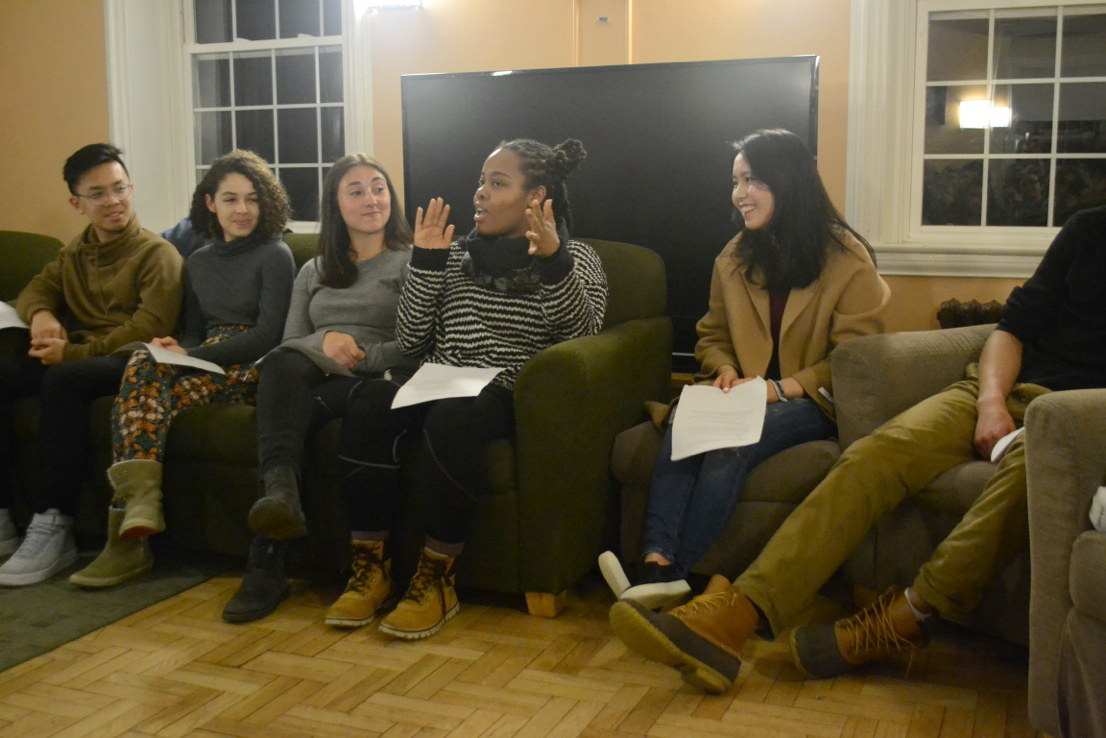Panel addresses inclusivity in College Houses
March 31, 2017
At a panel entitled “Why do College Houses Feel So White? Part Two” hosted by Reed and Ladd Houses on Wednesday night, students discussed how music, drinking, sports and other factors perpetuate racial divisions—in College Houses and at other parties on and off campus.
Last year, the Office of Residential Life (ResLife) sponsored a similar panel to address perceived racial disparities in the College House system. Although the racial composition of students living in Houses is similar to that of the student body as a whole, many students expressed that Houses still felt like white spaces.
“Last year, [the panel] was led by ResLife, so there was a different vibe to it—it filtered some people’s comments,” said Kitrea Takata-Glushkoff ’19, a member of Reed and one of the students who organized the panel.
As with last year’s panel, many students highlighted music as racially divisive.
“Music is racialized,” said Beleicia Bullock ’19, one of the panelists. “A lot of particularly black women are raised with the perception that music and dance are inseparable— you don’t do one without the other. When you come [to Bowdoin] and you realize that some people really do music without dancing, it isn’t matching up.”
Harrison Dunne-Polite ’19 reflected a similar sentiment, adding that music reflects and determines what is considered culturally normal.
Students also discussed the role of athletics in shaping the identity of College Houses. Avery Wolfe ’19 noted that a lot of male sports teams host events at College Houses. She added that the composition of the sports teams at Bowdoin contributes to the dominant culture of the social scene.
“When you’re coming into a house with an all-white athletic team chanting and drinking, you feel like you need to be a part of that or that it’s not a space for you,” Wolfe said.
“Drinking and partying itself is a privilege,” said Christine Shin ’19.
Bullock echoed that sentiment, noting that her own perception of whiteness contributes to her understanding of College Houses.
“There’s this idea [that] privilege, higher socioeconomic status, lack of responsibility is all associated with whiteness,” Bullock said.
However, students noted that these perceptions about parties and privilege do not apply only to College Houses. Panelists addressed how off-campus houses have grown as social spaces this year.
Private parties, students said, have both benefits and drawbacks.
“When you have the space and autonomy to control the music, you have the power to be more inclusive,” said Simon Chow ’19.
At the same time, the public atmosphere of College Houses means that they still play a central role in the campus social scene.
“College Houses are a communal space for people to meet. When you get more private, people are more hesitant to go to your apartment,” said Hannah Cooke ’18. “There needs to be some restructuring done in how we organize events and connect people.”
At College Houses, which are meant to be inclusive spaces because of their public nature, the racial makeup of the Houses themselves can sometimes create an unwelcoming environment. Reflecting on an experience as a resident of Baxter House, Shin noted that she sometimes felt like a token person of color.
“It made me feel like I was just a number; I was just at Baxter so white people could say Baxter is so diverse and inclusive,” Shin said.
Students also addressed their own agency in changing culture. Tobi Omola ’19, programming director for Ladd, said he took the position hoping to making the House a more inclusive space. Takata-Glushkoff expressed a similar rationale for her choice to live in Reed.
“Living in a College House, as a person of color, I’ve been able to reach out to people who wouldn’t otherwise be attending this event,” she said.
The panel was organized by Takata-Glushkoff, Omola, Lucia Ryan ’19, Tessa Epstein ’19, Hugh Cipparone ’19, Tim Moran ’19 and Senay Yibrah ’19, and moderated by Moran and Mitsuki Nishimoto ’17. The panelists were Chow, Bullock, Dunne-Polite, Wolfe, Cooke, Shin and Amber Rock ’19.


Comments
Before submitting a comment, please review our comment policy. Some key points from the policy: